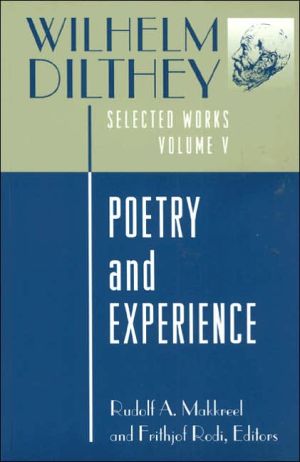

 |

|

The average rating for Wilhelm Dilthey: Selected Works, Volume V: Poetry and Experience based on 2 reviews is 3.5 stars.
Review # 1 was written on 2017-10-27 00:00:00 Gary Tremaine Gary TremaineI concetti di Dilthey espressi in questo prolisso ma significativo testo sono riassumibili in pochi semplici punti: attraverso quattro ben documentate e precise monografie, dedicate, rispettivamente, a Lessing, Goethe, Novalis e Hölderlin, il filosofo tedesco intende esplorare le "Weltanschauung" dei singoli autori in modo da mostrare come, nel caso della cultura tedesca, ci sia stata un'evoluzione che ha dato significativi apporti alla cultura e alla riflessione sulla vita e sul mondo circostante. Tralasciando l'accesa enfasi con cui Dilthey compone le monografie, che potrebbe essere derivata dagli sviluppi dell'Idealismo tedesco (in fondo, come storico, si è occupato di Schleiermacher, che dopo la "triade" Fichte-Schelling-Hegel era il maggior rappresentante del movimento), tra le righe dei quattro solidi saggi si scorge l'intento di fondare un nuovo modo di intendere l'estetica che si erge sul concetto di espressione. Dilthey, infatti, ritiene che le potenzialità rappresentative della poesia siano superiori a quelle di cui dispone la pittura. Di conseguenza, l'estetica non si focalizzerà più sul concetto di "mimesi", cioè sull'osservazione disinteressata o meno della realtà per cercare dei modelli, bensì darà peso all'"Erlebnis" del poeta, la sua esperienza vissuta; l'opera poetica, cioè, trapela dal vissuto interiore del suo autore e attraverso di essa viene storicizzata e si carica di significati solo in riferimento al mondo in cui egli è stato partecipe. Dilthey, tuttavia, vuole anche andare oltre questo fatto e tentare, in riferimento a Schleiermacher, di compiere un processo di ermeneutica: nonostante, infatti, le poesie restino storicizzate nel periodo e nel sentire in cui esse vengono composte, si può comunque tentare in esse di cogliere dei significati universali, le si possono interpretare in un'altra ottica attraverso un processo di comprensione che sarà oggetto centrale di discussioni lungo tutto il Novecento, da Heidegger fino a Gadamer. Queste sono, in conclusione, i principali spunti che si nascondono dietro l'eccessiva prolissità dell'opera: è una lettura non impegnativa ma consigliata esclusivamente agli appassionati della letteratura tedesca del XIX secolo o agli amanti della filosofia, perché probabilmente dopo un po' di pagine, se i dettagliati ragionamenti di Dilthey intorno agli autori non riescono a convincere il lettore, questi faticherà tanto ad arrivare all'ultima pagina. Resta comunque un'opera centrale per un filosofo alquanto importante per il pensiero del secolo scorso, e nonostante io, personalmente, ritenga la pittura ben più potente della poesia, sono rimasto comunque soddisfatto dagli spunti che Dilthey stesso è riuscito a darmi. |
Review # 2 was written on 2008-06-09 00:00:00 Gianfranco Girotto Gianfranco Girottothis is a a particularly stodgy-looking volume--the hardcover has a little profile cameo of dilthey and is grey. inside there are 4 main texts written between 1887-1910--what holds them together is dilthey's project of historicizing aesthetics in general, poetics in particular (relativizing the traditional categories, making the methodology more inductive) and interest in making things as a psycho-social process. not surprisingly, dilthey's work in this area is also a product of its situation (whence the emphasis on genius in the earlier texts and on the always irritating goethe/holderin nexus of "great germanic poetry" the "highest expression of the german spirit" blah blah blah in the later)... poetry linked to process, to forming, to generating representation not in the sense of image-of but more in the sense of pattern (networks of associations/distinctions, valences, etc), so not an Event in the old-school poetry-as-Oracular sense but an event in the sense of traces of the processes of bringing-into-relation---but this presupposes an equivalence between poetry as a surface and perception that tends to efface technique. on the other hand, dilthey worries the problem of communication--if there is something of an event-status to poetry, that event refers mostly to the person doing the writing: so what links the experience of poet to that of reader and how does this linkage work? which brings technique back in again. turn of the century academic types of technique, of course--newer versions could run in other directions. dilthey probably lay as much behind benjamin as does marx, if you think about it. anyway--> this is perhaps best approached from one of two directions: either knit into a broader reading of dilthey's other writing (which would enable controlling for the terminological looseness and emphasis on emotion which is of a piece with it in favor of the more rigorous frames in his historical/hermeneutics) or as material to be cut up. |
CAN'T FIND WHAT YOU'RE LOOKING FOR? CLICK HERE!!!